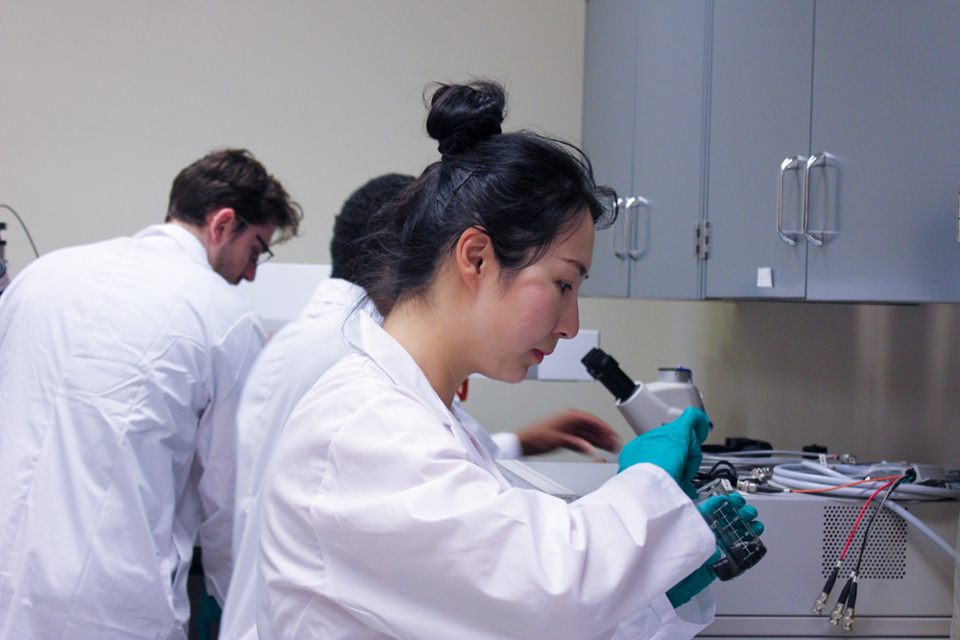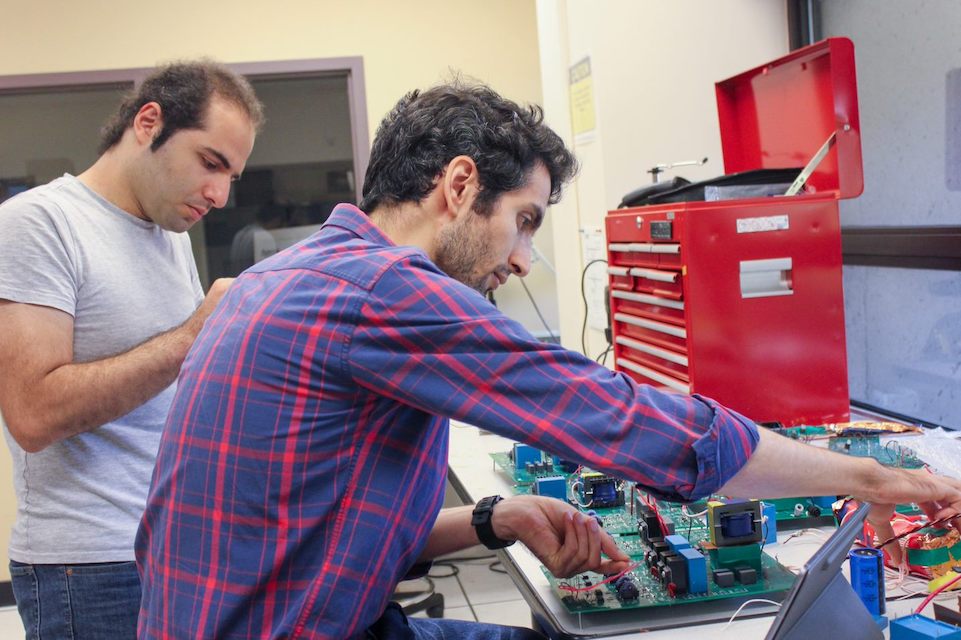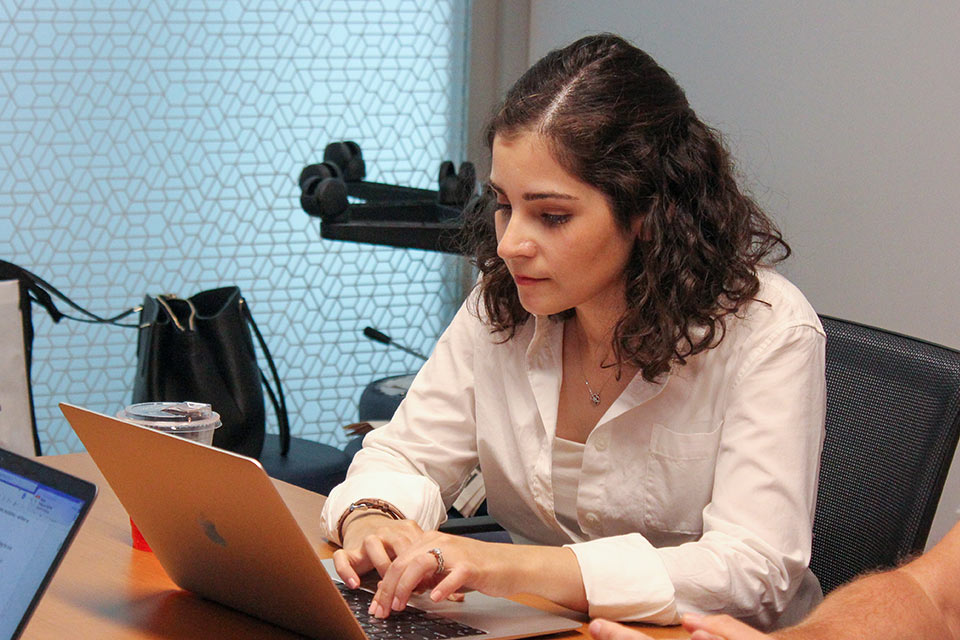Master of Applied Science (MASc) in Electrical and Computer Engineering

As a PhD student in the Department of Electrical and Computer Engineering, you can play a vital role in researching and developing future technology. We offer opportunities for cross-disciplinary collaboration, both at Queen’s and abroad.
During the first month of the program, the department, in consultation with the student's supervisor(s), establishes the PhD Advisory Committee consisting of the supervisor(s), an internal examiner, and a department representative. At this time, an area of research is chosen. The internal examiner should have expertise close to the candidate's general research area. The requirements to be fulfilled include a minimum of 4 term-length graduate courses beyond the master’s degree, a two-part comprehensive examination, the seminar course ELEC-891, satisfactory research progress and a thesis. One of the graduate courses must be taken from outside the department, and one of the graduate courses must be taken inside the department. Only one course may be a double-numbered graduate course (also known as combined undergraduate/graduate course). Fourth-year undergraduate courses cannot be taken for credit toward PhD program requirements, as per Smith Engineering at Queen's Graduate Council Regulation 2.1.5. The supervisor(s) and the department must approve all programs of study.
For students who received a master’s from the same department at Queen's and in the same area of study, the minimum course requirements shall be decided in consultation with the PhD Advisory Committee and approved by the Department Head or Graduate Coordinator.
All PhD candidates will take a comprehensive examination administered in two parts by the candidate's PhD Advisory committee. Part I deals with the candidate's background in their chosen area of research. Part II consists of the candidate's thesis proposal. The PhD Part I report must be submitted to the department within 10 months of the start of the program, and the PhD Part I Comprehensive Examination should be held no later than two months from the report submission date. For Part II, the PHD Advisory Committee for the Part I exam is augmented with an external/Internal examiner (outside the ECE Department, within Queen's University). The PhD Part II report must be submitted to the department within 22 months of the start of the program, and the PhD Part II Comprehensive Examination should be held no later than two months from the report submission date. After the successful completion of Part II, thesis research progress is reported by the candidate and reviewed by the PhD Advisory Committee annually.
A bachelor’s degree in engineering or a closely related field.
Domestic Applicants
75% or B+ or Upper Second Class Standing
International Applicants
P.R. China: 80% or GPA of 3.1/4.0
India, Bangladesh & Pakistan: First class or 63%
Iran: 16/20
All others: 80%
Curriculum Vitae
We require curriculum vitae. Curriculum vitae is a detailed, structured listing of education, publications, projects, awards, and engineering work history. This document can be part of the online application or emailed to the department, or a hard copy can be included with your mailed documents.
English Proficiency Requirements
Proficiency in English is a requirement for admission. Applicants whose native language is not English will be required to obtain satisfactory standing in English language proficiency tests before their application can be considered for admission. We require a minimum of 7.0 on IELTS or 65 on PTE or for TOEFL; 580 (paper-based); 237 (Computer-based); and 88 (Internet-based) with a minimum score in each of the components: Writing test 24/30, Speaking test 22/30, Reading test 22/30 and Listening test 20/30. The results must be no more than two years old.
How to Submit English Language Test Scores
The School of Graduate Studies can access test scores directly from TOEFL, IELTS, PTE Academic and CAEL CE databases. We do not require hard copies of your test scores sent from the testing center if we can obtain them directly from TOEFL, IELTS, PTE or CAEL.
TOEFL, PTE Academic and CAEL CE
Please ensure that you have the testing center release the TOEFL, PTE Academic, or CAEL CE score to Queen’s University (0949). Inform the School of Graduate Studies (following submission of your application) that your score report is available to retrieve electronically from the official testing center site. Email: sgsapp@queensu.ca
IELTS
Please provide the School of Graduate Studies with the TRF number found on your IELTS score report (following submission of your application) in order for us to obtain your IELTS test score electronically from the IELTS site. Email: sgsapp@queensu.ca
Hard copy test results: If you did not arrange to have the results of your English language proficiency test accessible to the School of Graduate Studies, you must request that the testing agency send us a hard copy official test results document either by email at sgsapp@queensu.ca or through regular mail (address below).
We do not require the GRE. Please do not send us official GRE scores.
Master of Applied Science or Master of Science
Before you begin your application, please review the graduate studies application process.
Fall Admission
Application due: January 31 (international), March 1 (domestic).
Notification of acceptance: usually the end of April for international students.
Winter Admission
Application due: August 15 (for both domestic and international applicants).
Notification of acceptance: usually mid-October for international students.
We encourage you to identify an area of research interest and contact potential supervisor(s) before applying. Visit research groups and faculty profiles. When you find a faculty member with similar research interests to yours, contact them to let them know about your interest in graduate work, area of research and related experience.
The minimum funding guarantee for domestic and international MASc students is $23,000 per year, up to four years, providing good academic standing and satisfactory progress toward the completion of the degree. The typical financial support package usually consists of research assistantships, teaching assistantship, graduate award(s) and/or a scholarship.
Domestic students are encouraged to apply for external funding from OGS, NSERC, and other sources. Top-up awards may be given to students who hold federal government Tri-Council Awards such as NSERC. Visit the School of Graduate Studies’ Awards and Scholarships for more information.
The department may also nominate students to the Graduate School for any internal scholarships available. The student does not submit an application.
Frequently Asked QuestionsThe Department of Electrical & Computer Engineering is home to nationally and internationally recognized researchers and cutting-edge research facilities. Our research is categorized into the areas of:
Our graduates have found careers:
Interested in learning more about becoming a postdoctoral fellow? Learn more through Queen’s School of Graduate Studies and Postdoctoral Affairs.
Graduate Program Assistant
Cheryl Wright
cheryl.wright@queensu.ca
613-533-6000 ext. 79307
Walter Light Hall, Room 416
Graduate Program Assistant
Debie Fraser
fraser.d@queensu.ca
613-533-2179
Walter Light Hall , Room 416A

Two-year thesis/research-based master’s program.

solid foundation in the principles of AI, machine learning, and deep learning.

Advanced engineering skills in a specific area of specialization.

This program is offered in collaboration by the departments of chemical, electrical and mechanical engineering.

This program is offered in collaboration by the departments of chemical, electrical and mechanical engineering.